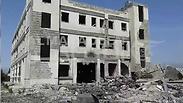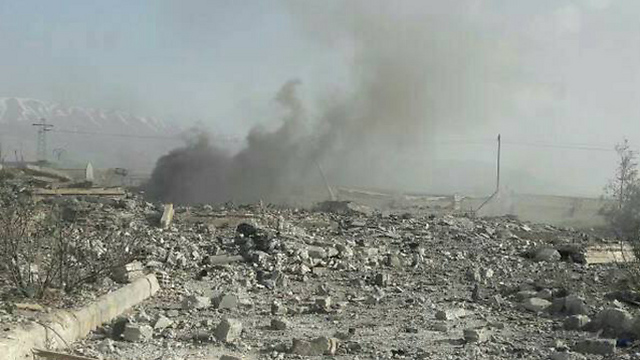
Greenlighting an Israeli attack on Iran in Syria?
Analysis: The Iranian takeover of Syria, as well as of Lebanon and Gaza, is no longer just Israel’s problem. There is a feeling in Jerusalem that if and when Israel is forced to put an end to the Iranian crawl into the Golan Heights, it will receive strong American backing.
Someone carried out a targeted assassination of three Syrians in the Golan Heights this week. Syria said they were soldiers who were killed in an Israel Air Force strike in the Quneitra area. The Arab media said they were members of Syrian militias operating in the area. Israel declined comment.
A day earlier, Israel attacked Syrian targets in response to the apparent spillover of mortar shells from Syria into its territory—and claimed responsibility for the strike. The assassination of the three Syrians, which some are attributing to Israel, is likely unrelated to the spillover incidents but rather to a different war.
For several years now, there have been reports about secret Israeli fighting in Syria in a bid to curb Iran and Hezbollah’s strategic effort to expand the northern front. Hezbollah leader Hassan Nasrallah is not hiding it. In one of his speeches, he explicitly spoke about a front against Israel from Rosh Hanikra to al-Hamah in the southern Golan Heights.

Iranian general Ali Allah Dadi, who was responsible for the Iranian infiltration of the Golan Heights, was assassinated in the northern Golan in January 2015. This assassination, which was attributed to Israel, brought to light the Iranian effort and the Israeli attempts to thwart it.
The Iranian infiltration included not only building a military force that would operate from the border, but also moves to eliminate what Iran perceived as ties between Israel and the rebel militias in the Golan Heights. The Iranians created special Hezbollah forces to lead the Iranian outpost in the Golan. The commander of this force, Jihad Mughniyeh, was assassinated in January 2015. The Iranians tried to enlist the Golan’s Druze as well as allies who would fight Israel. The person at the heart of this, Samir Kuntar, was assassinated in December 2015. These two assassinations made headlines because they involved “celebrities” in the world of terror, but other terrorists who were linked in one way or another to the Iranian attempts to build outposts in the Golan were killed as well.
After the assassination of the Iranian general, there was an apparent drop in the Iranian effort to infiltrate the Golan, especially as the Assad regime was on the verge of collapsing in 2015.
Over the past year, the Assad regime has stabilized. After occupying Aleppo, Assad began acting as if his war of survival was behind him, and as if he were about to regain sovereignty over all of Syria. The feeling that the Assad regime is stabilizing is allowing the Iranians to reinvest their efforts in implementing the strategy of “choking” Israel from all directions. At the moment, they are focusing their efforts in the Golan Heights, where members of the Revolutionary Guards and dozens of Hezbollah men are fighting alongside the Syrian forces against the Islamic State. The central and northern Golan Heights, however, are part of the plan too.
In early March, a spokesman for al-Nujaba—a Shiite-Iraqi pro-Iranian militia, which has been operating in Syria for four years—announced the formation of the Golan Liberation Brigades, a force trained by Hezbollah in Lebanon and the Revolutionary Guards in Iran. According to one report, the three Syrians who were assassinated last week belonged to this army. If this is the trend, the clashes between Israel and Iranian and pro-Iranian forces in the Golan Heights will expand.
In the Obama era, Israel was excluded from anything that had to do with US-Iran relations. In the Trump era, Israel is back to being an ally in the battle against Tehran. While the current administration has no intention of opening the nuclear agreements, it is working to settle a new score with the Iranians involving two issues Israel is concerned about, which the Obama administration swept under the rug: The expansion of Iranian terrorism in the Middle East and the UN resolutions regarding the development of long-range ballistic missiles.
These were likely the issues addressed by Defense Minister Avigdor Lieberman in his recent visit to the United States, and they were also at the focus of US Secretary of Defense James Mattis’ recent visit to Israel. Mattis heard similar things in his meetings with the leaders of Saudi Arabia, Jordan and Turkey. The Iranian takeover of Syria, as well as of Lebanon and Gaza, is no longer just Israel’s problem. There is, therefore, a feeling in Jerusalem that if and when Israel is compelled to forcibly uproot the Iranian crawl into the Golan Heights, it will receive strong backing from America.
(Translated and edited by Sandy Livak-Furmanski)










